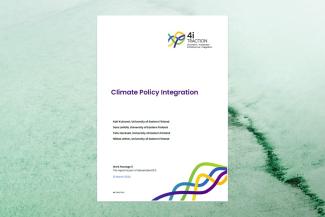
Kulovesi, K., Lehtilä, S., Hocksell, T., Löther, N. (2024): Climate policy integration. University of Eastern Finland; Joensuu.
Climate Policy Integration
This case study takes stock of climate policy integration as part of procedural climate governance in the EU and provides recommendations for further strengthening integration so as to ensure that the EU achieves its climate neutrality objective.
Climate policy integration (also known as climate mainstreaming; hereinafter referred to as CPI) refers to the systematic incorporation of climate change considerations and objectives into various policy areas and decision-making processes at different levels of government. The aim of CPI is to ensure that climate change is not treated as an isolated issue; climate policy must be integrated across sectors and policies to promote synergies and holistic approaches to addressing climate challenges. CPI also requires collaboration and coordination between different government departments, agencies, and stakeholders to address climate change challenges comprehensively. In this report, we aim to take stock of climate policy integration as part of procedural climate governance in the EU.
We find that the European Climate Law (2021/1119) has strengthened the status of CPI in EU procedural climate governance. It has done so by introducing the first CPI-related legal obligation, requiring the European Commission to screen the consistency of its policy and budget proposals with the objectives of the European Climate Law. However, there is scope to further strengthen these requirements in the context of the review of the European Climate Law, mandated to take place within six months of the first Global Stocktake under the Paris Agreement. We identify the need to consider legal codification of the Do No Significant Harm -principle included in the European Green Deal (EGD) Communication. Overall, we find further scope for strengthening legal requirements for CPI in the EU procedural climate governance framework. Here, the report aligns with the recent recommendation by the European Scientific Advisory Board on Climate Change in January 2024 that achieving climate neutrality by 2050 requires removing policy inconsistencies.